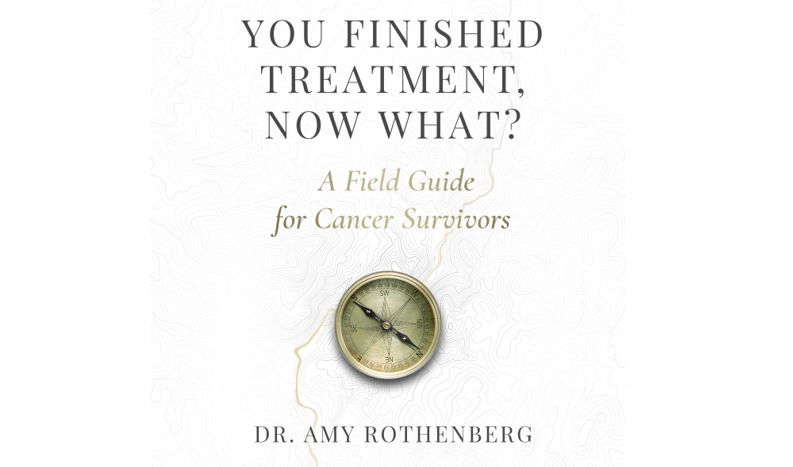PUBLISHED: 23rd August 2022

By Dr. Amy Rothenberg
Excerpted from the introduction to the book:
You’d think the last day of chemo or the final radiation treatment would be a time to rejoice and celebrate. But for many of us the last day of treatment is soon followed by a sense of dread and despair. The fighting stance and the rallying cries end. The outpouring of support slows. It’s onto life “as usual,” not easy if you don’t feel well and medical “active surveillance” seems served up with a hefty portion of stress and anxiety. This is especially true for those with genetic mutations that make us more susceptible to falling ill.
The number of survivors is ever-growing1 as treatment for all kinds of cancer improves. By the 2040s there will be more than 26 million cancer survivors. Providers of all types will be working with survivors over many years, yet clinical recommendations are lagging, even while the scientific research has made great strides.
For many cancer survivors, there are effects from treatment that are ongoing, alongside other physical health issues, as well as mental health challenges. I wrote a book about being a patient, being sick, getting better and staying healthy, and how that is possible—to one degree or another— for any individual person. I know this terrain intimately as a breast and ovarian cancer survivor/thriver and as a licensed naturopathic doctor. I wrote extensively about using natural, integrative medicine during cancer care.2 And now, commit to daily proactive steps to regain my health after being treated for both cancers in 2014. And I continue, years out, with recommendations that encourage physical vitality, mental clarity, and emotional balance while doing all I can to reduce my risk of recurrence.
I know well the twisting road that a cancer diagnosis lays forth from the scores of cancer patients I have treated alongside their skilled conventional medical providers. Some patients remain with side effects of treatment, from low blood counts to lymphedema, from “chemo brain” to skin issues, from weight loss to digestive disturbances, from anxiety and depression to insomnia and fatigue — and any other number of overlapping complaints. My research and recommendations aim to help rebuild, restore and support the innate resilience of the human body and spirit. Some are quite general, others more pointed to specific complaints.
We know that chemotherapy, radiation and normal aging all lead to a number of physiologic processes like shortened telomeres3 and an uptick in circulating inflammatory agents. There is increasing evidence that lifestyle and natural medicine approaches have the potential for positive impacts here. In other words, side effects are modifiable and in many, but not all cases, reversible.
My work with colleagues aimed to enhance efficacy of my conventional care, prevent side effects, address side effects that arose, and offer general support throughout my time in treatment. We worked together to create a treatment plan that dovetailed with the details of my medical story and also took into account my temperament and my capacity to do the work that is part of getting well again and staying healthy.
It's ever true that your body reflects the habitual, not the occasional. Being kind and gentle with yourself, is also an important part of healing. I prefer when my patients make slow, gradual, more permanent needed changes, instead of trying to change everything all at once.
Natural medicine cannot help everything, but I feel sad when I hear patients say, “Well, I’m lucky to be alive, I can live with this.” Let’s face it: we’re all lucky to be alive. And quality of life matters, too. I offer help, without giving false hope, by laying out many of the evidence-based approaches available. I hope you will enjoy the book, feel inspired to take clear steps to recover from treatment and work to reduce the risk of recurrence. As I often say to newly diagnosed patients or friends, “Welcome to the Club!” While it’s a club that no one really wants to be in, there is a growing sense of community and shared experience which an important part of healing, too.
1 N Engl J Med 2018; 379:2438-2450 DOI: 10.1056/NEJMra1712502
2 https://www.huffpost.com/entry/say-goodbye-to-the-girls_b_4829907
3. Curr Opin Clin Nutr Metab Care. 2011 Jan; 14(1): 28–34.
Available wherever books are sold.
POSTED IN: Books And Movies , Cancer Treatment
TAGS: Breast Cancer , Ovarian Cancer , Cancer Treatment